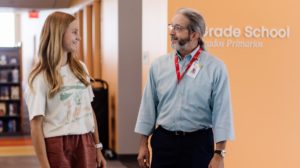What Makes an Older Youth Specialist at CASA?

CASA of NWA created the Older Youth Specialist role in 2013 after seeing and understanding the gap of how this subset of foster children faces additional barriers due to a number of factors, including their extended time in care.
Older teens in care may be more likely to have experienced compounded trauma. As a result, these youth often face emotional and behavioral challenges that can sometimes be hard to manage. Older youth are also more likely to have switched schools more frequently and may be behind academically. Not only do they lose academic ground by changing schools, but they may also lose valuable time learning each week due to visitations and therapies. This can be the case for any child in foster care, however it’s more likely that older youth in particular have been facing these for a longer period of time, and they are in the middle of making a delicate transition into adulthood. Additionally, an 18+ year-old living on their own may unintentionally become less of an immediate priority in an already strained child welfare system.
These are just a few of the challenges older youth face in foster care, and this is part of why we believe it is essential to have a dedicated staff member looking out for them. According to our current Older Youth Specialist, Sadie Perkins, the “theory or idea behind the position is to be another layer of support for the kids and the advocates who are serving older youth.” It is especially important for newer advocates to know how to navigate the extra barriers older kids are likely to face and know that we have someone to go to specifically for that.
The Older Youth Specialist holds a lot of information pertaining to the services both CASA and The Department of Children and Family Services (DCFS) offer older youth, as well as local community resources. For example, there are a lot of intricacies regarding independent living, including funding, employment, education, services, etc., that Sadie can walk through with our CASA volunteers and their teens. Due to staffing issues within DCFS, they do not currently have a transitional youth worker. Sadie helps fill this role by providing direct support through staffings— a time for everyone involved to talk about where the kids are, what the challenges are, what they’re working on, and brainstorm solutions. “A lot of it is being available and offering help researching options,” Sadie shared.
CASA of NWA also co-hosts an Independent Living Program (ILP) class which focuses on preparing older youth in foster care on how to transition to living independently. The topics of these classes range, including things such as setting up insurance, doing laundry, grocery shopping on a budget, maintaining a vehicle, financial literacy, and much more. We aim to introduce youth to skills and ideas they may not have been introduced to while in foster care.
Many of these older youth have a history of school transfers, missing school for court, visitations, therapy, and trauma-related issues with their mental health and behavior. It is not uncommon to see 17- or 18-year-olds in 9th or 10th grade because of the impact being in foster care has had on their education. When it comes to access to resources for these youth facing aging out of the system, Sadie can give concrete answers and get the ball rolling on what or who can pay for things.
This is why it is so important for these kids to have a CASA volunteer, someone that makes sure they are not walking alone as they make a significant transition into the rest of their lives. Our Older Youth Specialist is part of a much larger collective effort to give these kids some of the attention they need.
Sadie is motivated by sharing her knowledge with the individuals that work directly with these children, and they have no shortage of appreciation for what she does. A CASA Volunteer recently featured in our Volunteer Spotlight series had this to say about Sadie:
“Absolutely invaluable. The way [Sadie] is available to me has blown my mind with her availability and her willingness to be available to me at all times, no matter what. She has never made me feel as though I should have done something different. I truly feel like she has gotten in the trench with me; she has walked me through every single process up to today.”
That’s what makes an Older Youth Specialist.